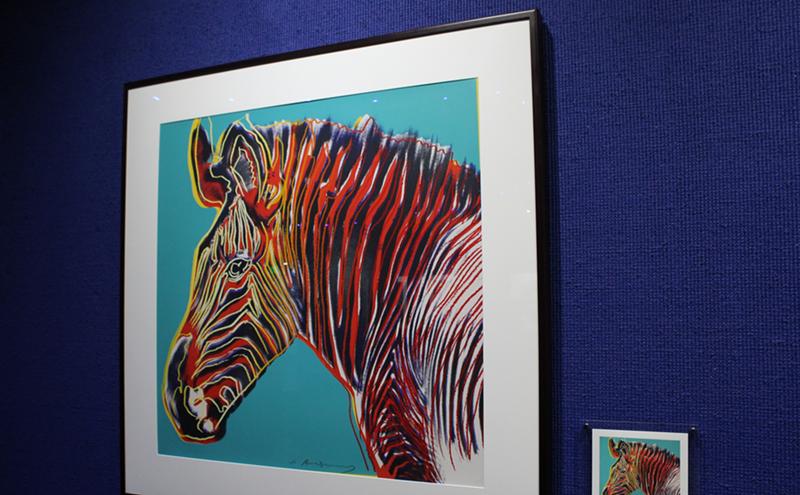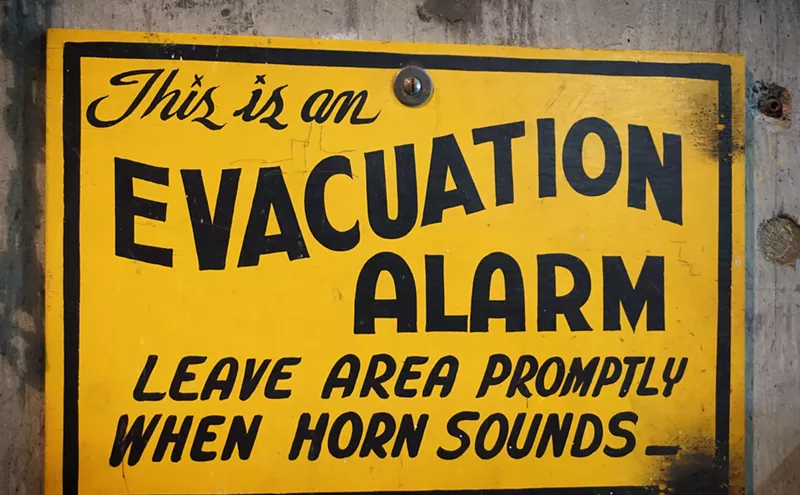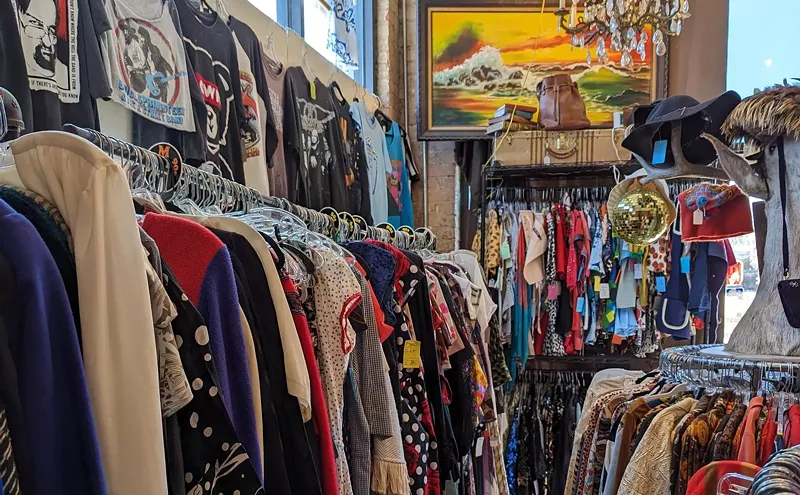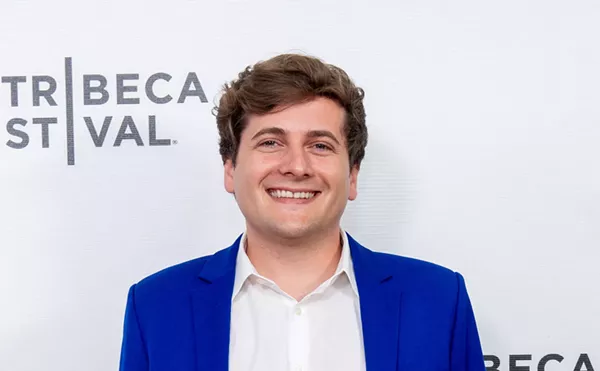The old man keeps on talking, keeps insisting he was in possession of the "story that'll blow everything away, blow the lid off of everything." Only after what feels like an eternity does the old man tell him what he's going on about: "I know somebody who was involved with the assassination of President Kennedy," he says, sounding very much like someone telling the truth.
"And it was an incredible thing to hear," Burger recounts now. "I asked him a few questions, but he wouldn't talk, in that very strange way of people just not answering you and turning away or looking away like he's not hearing me. Finally he got up, I presume to go to the bathroom, and he never came back."
Burger didn't believe the old man. Who would? Crazy shit like that happens every day: some crank insisting he knew someone who was in Dallas on November 22, 1963; some kook who knew the guy who did the shooting; some nut who says, hell, he did it. But Burger couldn't shake it. It was a haunting encounter. No way he was telling the truth. But...what if?
It is now 2002, and making its way through the film-festival circuit is Burger's movie about the man who really killed John Kennedy. His name is Walter Ohlinger, a former Marine sniper who insists he was the grassy knoll gunman, the real assassin. Not a "scapegoat" like that "idiot" Oswald, but a man proud to have Kennedy's blood on his hands. "Killing someone's easy," says Ohlinger, speaking to the camera that never takes its shaky, unblinking eye off him for 85 minutes. "The trick is getting away."
And he did get away and get away with it, till last year, when a dying Ohlinger, his body rotten with cancer, decided to confide in Ron Kobeleski, an out-of-work San Bernadino, California, TV-news cameraman who lived across the street. Ohlinger had proof, the spent shell, and named names, among them John Seymour, his commanding officer in the Marines who recruited him for the killing. Ohlinger had no idea why Seymour wanted Kennedy dead, and he did not care.
"People wanted him out for good reason, and I got him out," Ohlinger drones in the documentary, titled Interview with the Assassin. "I was a hotshot back then, a sick fuck...You kill the most powerful man in the world, I'd say that makes you the most powerful, don't you think? I was ready for that." Ohlinger spends the entirety of Interview with the Assassin trying to prove to Kobeleski he did in fact pull the trigger: They buy guns, meet with old soldiers, tangle with shadowy figures who may be on their trail, meet up with a dying Seymour in a hospital room and, finally, end up in Washington, D.C., where the current president is about to speak. By film's end, we are not quite sure whether Ohlinger killed Kennedy, only that he truly is a dangerous man quite capable of murder; if he didn't kill Kennedy, he surely killed someone.
Only, Walter Ohlinger does not exist; he is played by a character actor named Raymond Barry, who has appeared in such films as The Ref and Training Day. Ron Kobeleski likewise is a figment of Neil Burger's imagination, played by actor Dylan Haggerty. And Burger's documentary is entirely a work of fiction, despite bearing all the trademarks of cinema vérité--the shaky handheld digital camerawork, the sketchy sound, the stammering speech patterns of everyday chitchat. Ten years after Burger met his man in Texas, he made him real--real enough, that is, to confound even those who know Interview with the Assassin is totally make-believe.
"I have conversations with people who have seen the film," Burger says. "I tell them it's fiction, and they say, 'Yeah, but he's the real guy, right?' I say, 'No, he's an actor.' They'll say, 'Yeah, but that's what happened, right?' And I say, 'No, it's fake.' But people hold on to the idea of it or are unwilling to let go of that, which is great, because I think there's a certain energy and experience that you get from the movie because of that, and it backs up what the movie's about."
Interview with the Assassin will not go into wide release till November--it opens in New York and Los Angeles on the 15th, in Dallas on, dear Lord, November 22--but it will arrive in theaters with worthy buzz. In May, when it premiered at the Tribeca Film Festival in Manhattan, Variety praised it as a "potential Blair Witch Project for the conspiracy-minded [that] should have some real box office [success] on the indie circuit." Earlier this summer, Filmmaker magazine, which caters to the art-house crowd, included Burger on its annual list of "25 New Faces of Independent Film," along with Aaron Stanford, the star of Sundance hit Tadpole, and Coleman Hough, who wrote Steven Soderbergh's Full Frontal.
Ironically, distributors weren't much interested in Interview with the Assassin when producers Brian Koppelman and David Levien--both of whom wrote and directed the forthcoming movie Knockaround Guys, starring Vin Diesel and John Malkovich--started shopping it around earlier this year. There was some interest from Miramax and its boss, Harvey Weinstein, but Burger heard the distributor wasn't terribly interested in a perceived "anti-government" film, especially when trying to make a deal in the shadow of the September 11 terrorist attacks. Koppelman, who met Burger through their respective wives, and Levien insist they never encountered such criticism.
"For us, that has nothing to do with it," says Koppelman, a former music executive who helped bring Tracy Chapman to Elektra Records in the late 1980s. "It's not an unpatriotic film. That just doesn't make sense to us. For us, it's just a really well-executed film about a period in our country's history..."
Levien interrupts: "...the great American mystery, really..."
Koppelman continues: "...and I don't even know how to speak to that. You never know why somebody passes on something in the end. Nobody said that specifically to us. We heard from the agents who got involved in presenting the film that now might not be a good time to suggest that the government keeps secrets or something, but we moved ahead."
"What were we gonna do?" asks Levien.
"Apparently, Harvey was tempted," says Eamonn Bowles, president of Magnolia Pictures, which acquired Interview last spring. "I won't say the film's anti-government, but creepy paranoia wasn't sitting well with people. And then, everyone was saying the same things: We've been changed forever, we'll never be the same, irony is dead. And some of us were saying, 'Give it six weeks, guys.'"
The trick for Magnolia is to market the film not as novelty, but as the masterful film it is. There might be the temptation to Blair Witch it to death, to try to trick people into thinking it's doc and not mock, but Bowles insists to do so would make no sense. The conspiracy theorists would turn up their noses at such fraud, and the non-assassination-obsessed audience would likely dismiss it as a slight goof. Besides, the movie is not at all interested in "proving" Walter's the killer; that would have been dull and not a little pointless. Rather, it's concerned more with how Walter and Ron need each other and use each other to make names for themselves. They're nobodies desperately trying to be somebodies: Walter needs Ron to validate him, while Ron needs Walter to jump-start his moribund career. "They're both having a crisis of identity," Burger explains. "They both feel like they're nobodies, and they're hitching themselves to each other's wagons to try to drag themselves to something more important."
Not that Burger, a one-time ad man, wasn't considering trying to put one over on audiences. Early on he thought about doing away with any credits--still, they appear only at film's end--and was close to casting as Walter a former Marine sniper with 50 kills and "the sort of dead look in his eye, like he had done and seen some very, very bad things," Burger says. But the rigors of shooting quickly (in 22 days) and inexpensively (it cost about $750,000) made it difficult to use a rookie, especially when he would appear in nearly every frame. In the end, they went with Barry, who's still unrecognizable enough to lend the movie a freaky kind of verisimilitude. "We decided it was more important to have a great compelling actor than a gimmick, basically," Burger says.
In the end, the filmmakers decided to sign with Magnolia precisely because Bowles promised not to sell it like a stunt, as opposed to one distributor that wanted to premiere the film in Washington, D.C., which Burger considered at once tasteless and pointless. So there will be no Web site with a phony back story insisting this really happened; there will be no made-for-TV specials or tie-in books documenting the life of Walter Ohlinger, Kennedy killer. Magnolia will simply open the film as it would any would-be art-house hit and hope word of mouth does its job, and it should: You can't see Interview with the Assassin without wanting to show it to a dozen friends, if only to see if they think it's the real thing.
"If Blair Witch never came along, I think we'd be in a much better spot," Bowles says, laughing. "The comparison to Blair Witch cheapens it in some ways; it makes it look like an imitation, and this film is really an original work. It's a really sophisticated piece. We're not selling this as something that says, 'This is as it actually happened,' but there are gonna be some people who go in with not that much information about the film, and this has happened, and think it was real. It didn't dawn on them until either very late in the film or when the credits rolled that these were actors. One reviewer said, 'Oh, my God, I thought the whole thing was real!' But he was from High Times."












